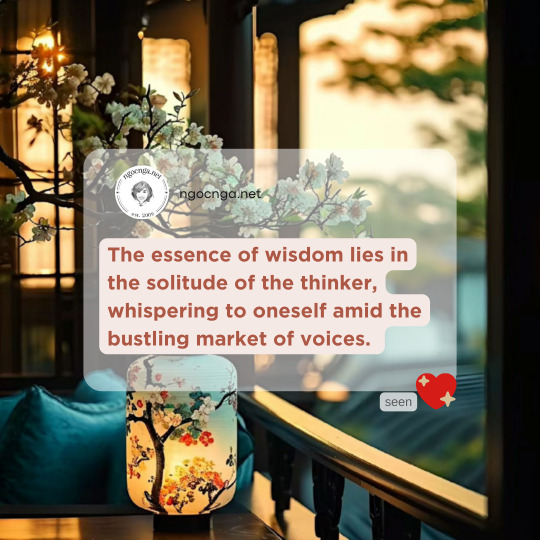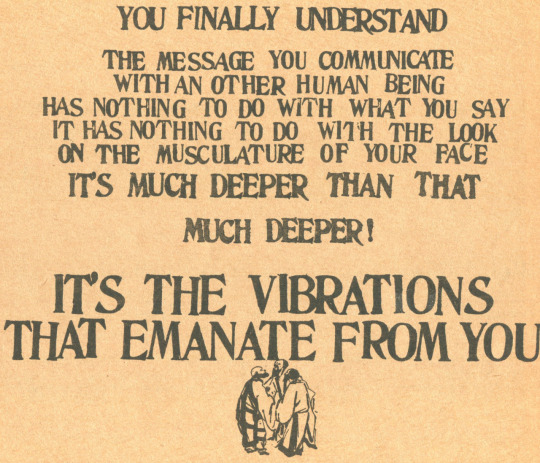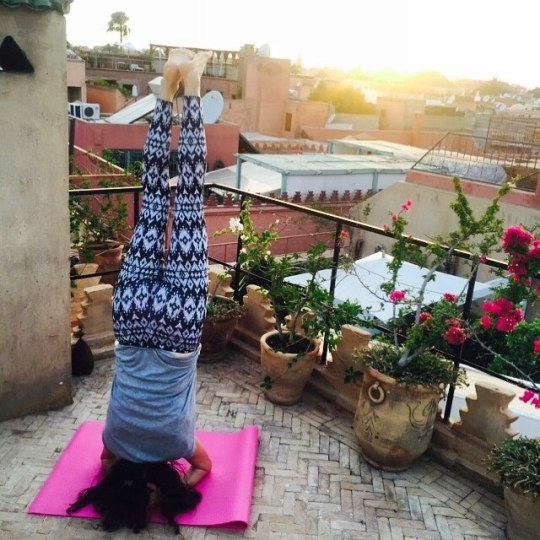#InnerReflection
Explore tagged Tumblr posts
Text
In life's journey, health is the greatest wealth. He who possesses it finds a priceless treasure in every breath.
#poets corner#poets on tumblr#quoteoftheday#quotes#poetry#life#feelings#quote of the day#life quotes#poetry quotes#wisdom#words#writers on tumblr#writing#thoughts#spilled thoughts#spilled ink#motivationdaily#inspirationquotes#lifeisbeautiful#poetryoflife#creativeexpressions#wordsofwisdom#liveinspired#poetryislife#inspiringquotes#lifepassion#quoteofthemoment#poemsporn#innerreflection
21 notes
·
View notes
Text

#SelfAwareness#Discernment#SpiritualGrowth#InnerReflection#PersonalDevelopment#Mindfulness#SelfCheck#InnerHealing#GrowthMindset#MentalClarity#EmotionalIntelligence#SpiritualJourney#CheckYourself#SelfImprovement#AwakenedSoul#ConsciousLiving#SoulCare#Introspection#MindBodySpirit#TrueAlignment
14 notes
·
View notes
Text
Profound Introspection: A Journey into Deeper Understanding and Connection

Profound introspection is more than simple self-reflection; it’s an intentional, often transformative, exploration into the depths of who we are, why we exist, and what our purpose might be. This journey goes beyond surface-level thoughts, pushing us into the uncharted territories of our own minds and spirits. It calls for honesty, courage, and a willingness to confront both the light and shadows within us. Through profound introspection, we can find greater meaning, self-awareness, and a connection to the world and people around us.
The Nature of True Introspection
True introspection isn’t a fleeting thought or momentary self-evaluation. It requires dedicating time and space to be present with ourselves in a way that can be deeply uncomfortable yet liberating. The act of introspection involves examining our motives, actions, beliefs, and experiences—not merely as memories but as interconnected pieces of a larger puzzle. Each thought and choice is a part of our story, shaping who we are and where we are headed. Profound introspection encourages us to ask the difficult questions: Why do I react the way I do? What are my deepest fears and desires? Where does my true sense of worth come from?
Consider historical figures known for their wisdom, such as the philosophers Socrates and Confucius, who both emphasized the importance of self-knowledge. Socrates famously declared, "The unexamined life is not worth living," while Confucius taught that self-reflection leads to understanding virtue. These teachings underline a timeless truth: true growth, wisdom, and peace are achieved when we dare to look within.
Biblical Perspectives on Introspection
The Bible offers a wealth of examples encouraging us to look inward and understand ourselves more deeply. In Psalm 139:23-24, David prays, "Search me, O God, and know my heart; test me and know my anxious thoughts. See if there is any offensive way in me, and lead me in the way everlasting." Here, David acknowledges the importance of introspection guided by divine wisdom. He’s not merely asking for a cursory glance at his actions; he’s inviting God to examine the depths of his soul, revealing hidden motives and unresolved issues.
Similarly, the New Testament calls for introspection in the context of growth and transformation. In 2 Corinthians 13:5, Paul advises believers to "Examine yourselves to see whether you are in the faith; test yourselves." This is more than a simple self-check; it’s a call to ensure that one's beliefs and actions align with one’s values. By urging us to examine ourselves, the Bible encourages introspection as a means of staying grounded in truth, humility, and purpose.
The Power of Profound Introspection in Modern Life
In a world that often values speed and surface over depth and substance, profound introspection can feel countercultural. However, it holds immense value for our personal development and well-being. Studies in psychology confirm that introspection and self-reflection are linked to greater emotional intelligence, resilience, and even physical health. When we take time to explore our thoughts and feelings, we reduce stress, gain clarity, and build a deeper sense of identity.
Real-life examples show the power of introspection in action. Consider individuals who have experienced significant challenges—such as addiction, trauma, or failure—who have chosen to face their inner selves rather than avoid them. For many, this journey of profound introspection becomes a pathway to healing. Through therapy, meditation, or spiritual practices, they confront buried pain, distorted beliefs, and unresolved emotions. By digging deeply, they not only find closure but also wisdom, strength, and a renewed sense of purpose.
One widely known example is Viktor Frankl, a Holocaust survivor and psychiatrist who used his time in concentration camps as a profound period of introspection. In the depths of suffering, he discovered that even in the most extreme conditions, one retains the freedom to choose one’s response. This insight formed the basis of his therapeutic approach, known as logotherapy, which emphasizes finding meaning in life as the foundation for mental health. Frankl’s introspective journey led him to profound truths that have since inspired countless individuals facing hardship.
Profound Introspection as a Spiritual Practice
For those seeking spiritual growth, introspection is essential. Many spiritual traditions, including Christianity, Buddhism, and Sufism, view introspection as a path to enlightenment, connection with the divine, and self-purification. Christian contemplatives like St. Teresa of Avila and St. John of the Cross explored the soul’s depths to discover God’s presence within, describing this process as a journey through an “inner castle” or “dark night of the soul.��� Their writings highlight how profound introspection can serve as a means of shedding ego, fear, and attachments to reveal a purer connection with the divine.
In modern spiritual practice, many people turn to meditation, prayer, and journaling as forms of introspection. Journaling, for example, is a powerful tool for exploring thoughts, desires, and patterns. When practiced consistently, it allows for an honest dialogue with oneself, where the individual can track growth, process emotions, and gain insight into the hidden layers of the psyche. Whether through a daily gratitude journal, reflective essays, or meditation, these practices encourage a deeper awareness of one’s own heart, aligning actions and values with inner truths.
The Challenges and Rewards of Going Deep
The path of profound introspection isn’t always easy. It often means facing uncomfortable truths, admitting to mistakes, and acknowledging areas for growth. However, it is in this vulnerability that true transformation occurs. By courageously facing our fears, shame, or guilt, we create space for forgiveness and healing.
Take, for instance, the process of reconciling broken relationships. Often, repairing bonds requires looking inward to recognize how our actions or attitudes may have contributed to the conflict. This kind of deep introspection, though painful, can lead to greater empathy, reconciliation, and understanding. It reminds us that humility and openness are essential for both personal and relational growth.
The rewards of profound introspection are well worth the challenges. Those who commit to this journey often experience heightened self-awareness, resilience, and an authentic sense of peace. They become more attuned to their purpose, understanding not just what they want but why they want it. This clarity enables them to make choices that align with their values, even in difficult circumstances.
A Heartfelt Call to Go Within
In a world full of distractions, profound introspection offers a sacred pause, a time to reconnect with ourselves, our values, and the things that matter most. It invites us to live with greater integrity and authenticity, to be unafraid of our flaws, and to embrace the growth that comes from facing ourselves fully. Like a sculptor chiseling away to reveal the form within, introspection is a process of uncovering the essence of who we are meant to be.
In conclusion, profound introspection is a journey worth embarking upon, whether for personal growth, spiritual awakening, or simply to live a life of deeper meaning. It requires courage, patience, and humility, but the reward is a life lived in alignment with truth and love. May we each find the strength to journey inward, embracing both the challenges and the beauty of discovering the depths of our own souls.
#ProfoundIntrospection#KebarRiverAltar#SpiritualSanctuary#BiblicalInspiration#Ezekiel'sVision#DivineCall#SourceOfLife#Revelation#SpiritualExploration#SelfDiscovery#CreativeExpression#Sanctuary#InnerReflection#PeacefulRetreat#Inspiration#Guidance#SpiritualGrowth#Contemplation#Meditation#ConnectionWithTheDivine
0 notes
Text
The Transformative Power of Inner Reflection: Sant Kabir’s Path to Universal Compassion

"Bura jo dekhan main chala, bura na miliya koi;
Jo dil khoja apna, to mujhe bura na koi."
I went looking for the bad in others, but found none;
When I looked inside my own heart, I found none to be bad.
Sant Kabir, the revered mystic poet, captures the essence of spiritual transformation in his doha, “Bura jo dekhan main chala, bura na miliya koi; Jo dil khoja apna, to mujhe bura na koi.” In this couplet, Sant Kabir profoundly shifts the focus from external judgment to inner reflection, revealing a path toward universal compassion and understanding. This doha invites us to transcend the limitations of ego, biases, and judgment, leading to a deeper connection with our true nature and the inherent goodness within all beings.
The Illusion of External Judgment
Sant Kabir begins by acknowledging a common human tendency: the search for faults in others. We often find ourselves entangled in judgments, quickly labelling others as "bad" based on their actions, words, or appearance. This tendency stems from our ego, which thrives on the illusion of superiority and separation. When we focus on the shortcomings of others, we distance ourselves from them, reinforcing the false notion that we are inherently different or better.
However, Sant Kabir’s wisdom reveals the futility of this external search. He finds that, in reality, no one is inherently bad. The flaws we perceive in others are often reflections of our own inner turmoil, misunderstandings, or unhealed wounds. This realization is a call to shift our focus from the external world to the internal—where true transformation begins.
The Journey Within: Discovering Universal Goodness
When Sant Kabir turns his gaze inward, searching his own heart, he experiences a profound revelation. By looking within, he uncovers the truth that no one is truly bad—not even himself. This realization marks a pivotal moment in spiritual growth, where the seeker transcends the duality of good and bad, right and wrong, and embraces the unity of all beings.
In spirituality, the heart is often seen as the seat of the soul, where the divine presence resides. By turning inward and connecting with the heart, Sant Kabir discovers that the essence of every being is pure, untainted by the judgments of the mind. This purity is the divine spark within all of us, waiting to be recognized and nurtured.
Sant Kabir’s doha encourages us to cultivate a compassionate heart, free from judgment and filled with love for all beings. When we truly see ourselves and others through the eyes of the heart, we realize that we are all interconnected, part of the same universal consciousness. This awareness dissolves the barriers of ego and opens the door to unconditional love and acceptance.
A Practical Toolkit for Embracing Inner Reflection and Compassion
To incorporate the wisdom of Sant Kabir’s doha into your daily life, here is a practical toolkit to help you cultivate inner reflection and universal compassion:
Daily Self-Inquiry: Begin each day with a few moments of self-inquiry. Sit in silence and ask yourself, “What judgments am I holding onto? How can I see this situation or person with compassion?” Allow the answers to arise from your heart.
Heart-Centered Meditation: Practice heart-centered meditation to connect with your inner goodness. Focus on your breath and visualize a warm light in your heart centre, expanding with each breath. As the light grows, imagine it embracing everyone around you, dissolving any judgments or negative thoughts.
Mindful Observation: Throughout the day, observe your thoughts and reactions. When you notice yourself judging others, pause and bring your awareness back to your heart. Ask yourself, “What is this judgment revealing about my own inner state?”
Compassionate Communication: Practice speaking from the heart in all your interactions. Before responding to someone, take a deep breath and ensure that your words are kind, understanding, and free from judgment. This will help you build deeper connections based on mutual respect and compassion.
Gratitude for Inner Growth: Keep a journal where you record moments of self-realization and growth. Celebrate your ability to recognize and release judgments, and express gratitude for the lessons each day brings.
Loving-Kindness Practice: Incorporate loving-kindness meditation into your routine. Begin by sending love and compassion to yourself, then gradually extend it to others—friends, family, acquaintances, and even those you find challenging. This practice helps to soften the heart and dissolve any remaining judgments.
Service to Others: Engage in acts of service, big or small, as a way to express compassion in action. Whether it’s helping a neighbour, volunteering, or simply offering a kind word, these acts reinforce the idea that we are all connected and deserving of love.
Non-Judgmental Listening: Practice listening to others without judgment or the need to offer advice. Simply being present and open to their experience allows you to connect more deeply and fosters a sense of mutual understanding.
By integrating these practices into your daily life, you will begin to see the world through Sant Kabir’s eyes—where the judgments of the mind dissolve, and the goodness of the heart shines through. This shift in perspective not only transforms your relationship with others but also deepens your connection to your own true self, leading to a life filled with compassion, love, and spiritual fulfillment.
Sant Kabir’s doha invites us to embark on a journey within, where we discover the universal goodness that lies at the core of every being. By letting go of external judgments and embracing inner reflection, we can cultivate a heart full of compassion, leading to a more harmonious and spiritually enriched life.
#KabirTeachings#InnerReflection#UniversalCompassion#SelfDiscovery#MindfulLiving#HeartCentered#SpiritualGrowth#JudgmentFree#CompassionInAction#SoulAwakening#SpiritualWisdom#InnerPeace#EgoDissolution#LoveAndKindness#ConsciousLiving#AGImageAI
0 notes
Text

For Vietnamese and Chinese versions, please check out: https://ngocnga.net/inner-reflection/?utm_source=tumblr&utm_medium=social&utm_campaign=quote ���♂️🌌🗣️ The essence of wisdom lies in the solitude of the thinker, whispering to oneself amid the bustling market of voices. // Suǒwèi zhìhuì, jiùshì gūdú zhě, zài rén shēng dǐngfèi de shìchǎng shàng, duì zìjǐ de qièqiè sīyǔ.
#1quotein3languages#chineselanguage#learnchinese#learnmandarin#studychinese#chinesewords#putonghua#weibo#chinese#mandarin#pinyin#quotes#quote#Wisdom#Solitude#InnerReflection
1 note
·
View note
Text
Exploring the Profound Allure of Intellectual Solitude: A Captivating Photograph
In this mesmerising photograph titled “Intellectual Solitude Captured,” a bespectacled man is shown deeply immersed in his own world. The image presents a thought-provoking portrayal that triggers a range of emotions, evoking introspection and the pursuit of self-discovery. It offers a glimpse into the intricate complexities of the human psyche, extending beyond the confines of a…

View On WordPress
#IntellectualSolitude#CaptivatingPhotograph#InnerReflection#SelfDiscovery#EnigmaticBeauty#SolitaryContemplation#QuietIntellectuals#HumanPsyche#ThoughtProvoking#EmotionalJourney#Individuality#SelfExploration#Quietude#PersonalGrowth#IntellectualPursuits#MindfulMoments#DeepThoughts#SoulfulJourney#CreativeExpression#ArtisticCapture#PhilosophicalInsights#Introspection#QuietContemplation#PursuitOfKnowledge#InnerWorld#EmbraceSolitude#EnrichingThoughts#SoulfulArt#MentalWellness#InspiredThinking
0 notes
Text

In the quiet moments of each day, let gratitude serenade your soul and within those depths of stillness, you can discover your truest reflection.🌿🎶
#thegypsyjoint#chronicallycalmlycollected#gratitudemelody#soulfulstillness#innerreflections#tranquilmoments
0 notes
Text
"Sacred Rituals: Elevate Your Everyday"
Sacred Rituals: Infusing Meaning and Tranquility into Daily Life” Introduction: In the hustle and bustle of modern existence, the practice of sacred rituals emerges as a sanctuary for the soul. This article delves into the profound significance of incorporating sacred rituals into daily life, exploring how these intentional moments can bring meaning, tranquility, and a sense of the sacred to the…
View On WordPress
0 notes
Text
"Sacred Reflections and Timeless Wisdom: Navigating Spiritual Understanding, Self-Reflection, and Time Perception"

किसी को समझना है तो उसे बेधड़क बोलने दो क्योंकि हर इंसान अपनी जुबां के पीछे छुपा है!!
एक दर्पण अपनी काबिलियत कभी नहीं बदलता,
फिर चाहे वह दो टुकड़ों में विभाजित हो या हजार टुकड़ों में.....
समय को समझना.. समझदारी. और समय को समय पर समझना.. ज़िम्मेदारी।
English Translation
"If you want to understand someone, let them speak freely because every individual hides behind their own language! A mirror never changes its capability, whether divided into two pieces or a thousand. Understanding time is wisdom, and understanding time on time is responsibility."
Introduction:
In the realm of spirituality, the profound saying "किसी को समझना है तो उसे बेधड़क बोलने दो क्योंकि हर इंसान अपनी जुबां के पीछे छुपा है!!" carries a timeless truth about the complexity of human understanding. This spiritual insight invites us to explore the depths of communication, self-awareness, and the significance of perceiving time in its true essence.
Understanding the Veiled Truths:
At the core of this spiritual teaching is the recognition that every individual harbors a unique narrative, concealed behind the veil of their words. To truly understand someone, we are urged to allow them to express themselves freely, devoid of judgment or preconceived notions. The saying advocates for a compassionate, open-minded approach, understanding that each person's journey is veiled in the intricacies of their own language and perspective.
In the spiritual context, this principle extends beyond mere verbal communication. It encompasses the art of empathetic listening, perceiving the unspoken language of emotions, and discerning the silent cries of the soul. By allowing individuals to express themselves authentically, we embark on a journey of spiritual understanding, recognizing the divinity within each unique manifestation of life.
The Reflective Mirror of Darpans:
The saying "एक दर्पण अपनी काबिलियत कभी नहीं बदलता, फिर चाहे वह दो टुकड़ों में विभाजित हो या हजार टुकड़ों में...." introduces the metaphor of a mirror, emphasizing the unchanging nature of one's capabilities and essence. In the spiritual journey, this mirrors the eternal soul, unaltered by external circumstances, whether divided into fragments or multiplied a thousandfold.
Each individual is akin to a unique darpān (mirror), reflecting their inherent capabilities, virtues, and spiritual essence. Despite life's myriad experiences and challenges, the core of one's being remains steadfast. This spiritual insight encourages self-reflection, prompting individuals to look into the mirror of their own consciousness and recognize the unchanging brilliance that lies within, regardless of external circumstances.
The Dance of Divided and Multiplied Reflections:
The metaphorical division and multiplication of the mirror allude to life's journey, where experiences may fragment or multiply the reflections of the self. In the spiritual context, challenges and triumphs shape the way individuals perceive themselves, sometimes leading to a fragmented self-awareness or, conversely, an expanded, multiplied understanding of their capabilities.
The saying encourages individuals to navigate life's diverse experiences with equanimity, recognizing that external circumstances do not define the eternal self. Whether the mirror reflects in two pieces or a thousand, the spiritual journey involves embracing every reflection as part of a larger cosmic dance, ultimately leading to a holistic self-awareness rooted in the eternal essence.
The Spiritual Significance of Samay (Time):
"समय को समझना.. समझदारी. और समय को समय पर समझना.. ज़िम्मेदारी।" introduces the spiritual significance of time, emphasizing the wisdom in understanding and responsibly perceiving the temporal dimension of existence. In the spiritual journey, time is viewed not merely as a linear progression but as a sacred rhythm, guiding individuals towards self-realization.
Understanding time requires a depth of wisdom that transcends the conventional clockwork. It involves recognizing the fleeting nature of moments, the cyclical patterns of life, and the transformative power embedded in every ticking second. This understanding extends to acknowledging the responsibility of perceiving time in alignment with its natural flow, recognizing that spiritual growth is intertwined with a conscious awareness of the present.
Time as a Teacher and Catalyst for Spiritual Evolution:
In the spiritual context, time emerges as a potent teacher and catalyst for personal and collective evolution. The saying encourages individuals to learn from the lessons embedded in the tapestry of time, understanding that every moment carries profound insights for those willing to be mindful observers. Time, viewed as a spiritual guide, prompts self-reflection and deep introspection, leading to a heightened awareness of the eternal now.
Furthermore, the concept of "समय को समझना" emphasizes the transformative potential of time when approached with wisdom. Through conscious understanding and receptivity to its teachings, time becomes a facilitator of spiritual growth, guiding individuals towards a more profound connection with themselves and the divine.
Conclusion:
In the intricate tapestry of spiritual teachings, the saying "किसी को समझना है तो उसे बेधड़क बोलने दो क्योंकि हर इंसान अपनी जुबां के पीछे छुपा है!!" unfolds as a profound revelation about the complexity of human understanding. Through the metaphors of mirrors, fragmented reflections, and the sacred dimension of time, we explore the depths of communication, self-awareness, and the responsibility of perceiving time in its true essence. This spiritual journey invites us to embrace the wisdom within words and uncover the transformative power of understanding, self-reflection, and timely perception.
#SpiritualWisdom#TimelessUnderstanding#ReflectiveJourney#EternalEssence#TimePerception#SelfAwareness#MetaphoricalMirrors#TransformativeWisdom#SacredReflections#TimelessTeachings#ConsciousAwareness#SpiritualGrowth#WordsOfWisdom#SelfDiscovery#TimelessTruths#PerceiveTheMoment#InnerReflections#SpiritualAwareness#JourneyWithin#WisdomInWords
0 notes
Text
Serene Beauty: A Journey of Peace and Divine Reflection

Serene beauty is a timeless, transcendent experience that evokes peace, quiet joy, and a gentle reminder of something beyond the everyday. In the Bible, we see numerous instances of people encountering serenity in nature or quiet places, where beauty itself seems to speak with a divine whisper, offering solace, clarity, and inspiration. This beauty isn’t confined to appearance alone; it’s a deeper state of harmony that reflects the essence of creation itself.
Beauty in Biblical Narratives
From the very beginning, the Bible illustrates God’s work in creating beauty that speaks to the heart. Genesis paints a picture of the Garden of Eden as a place of pure serenity—a paradise where the natural world thrives in perfect balance. The garden is filled with rivers, trees, and life of all kinds, described as "pleasing to the eye and good for food" (Genesis 2:9). It’s not just a functional place, but one designed to be beautiful and nourishing, encouraging a deep connection between humanity and creation.
Similarly, Psalm 23 poetically describes serene beauty through the metaphor of God as a shepherd, guiding us beside "still waters" and into "green pastures." These tranquil images are more than poetic embellishments; they serve as reminders of how beauty can calm, restore, and bring peace to the soul. It’s a beauty that invites trust and quiet rest, showing that the experience of serene beauty is often a doorway to encountering the divine presence.
The Power of Nature’s Beauty
The Bible frequently portrays nature as a reflection of God’s character, with serene beauty as a testament to divine care and creativity. Mountains, rivers, and deserts are all settings where people encounter God, reflecting that serenity is often found in nature's simplicity and vastness. In the stillness of these places, people find renewal and a deeper sense of connection. Take Elijah, for instance, who found God not in a whirlwind or an earthquake but in a "gentle whisper" after waiting quietly on a mountain (1 Kings 19:11-13). This scene shows that serene beauty often carries a quiet yet powerful voice, inviting us to listen and reflect.
Throughout the Psalms, nature’s beauty is praised as evidence of God’s handiwork. "The heavens declare the glory of God; the skies proclaim the work of his hands" (Psalm 19:1). The serene beauty of a sunset, a river’s flow, or a starlit sky is a gentle call to contemplate the vastness and order of the universe. It’s a reminder that amidst chaos or confusion, there exists a divine order, a steady rhythm that grounds us.
Seeking Serenity in Everyday Life
Serene beauty isn’t limited to epic landscapes or divine encounters; it can be found in simple moments and humble places. In our fast-paced world, seeking moments of beauty often requires intentionality. It may mean taking a few minutes to step outside, breathe in the fresh air, and notice the colors and textures around us. When Jesus taught his followers to "consider the lilies of the field" (Matthew 6:28), he was directing them to find beauty in the ordinary and let it remind them of God’s provision and care. These everyday encounters with serene beauty remind us that peace and beauty can coexist even in small, daily moments.
Even mundane routines can be transformed by recognizing beauty within them. The warmth of sunlight filtering through a window, the sound of gentle rain, or the quiet of a morning—all can be small sanctuaries of serene beauty that renew our spirits. In a way, these moments become prayers of gratitude, a way of seeing life itself as a gift and connecting with something larger than ourselves.
Examples of Serene Beauty and Personal Renewal
Many people have found that encountering serene beauty—whether in nature, art, or peaceful places—leaves a lasting impact. Consider people who hike through mountains, visit the sea, or simply enjoy the stillness of a park. These experiences can be transformative, not because they solve life’s problems but because they create a space for reflection, grounding, and spiritual refreshment.
The prophet Ezekiel had his first vision beside the Kebar River, a seemingly unremarkable place that became the setting for a profound experience of divine revelation (Ezekiel 1:1-3). This quiet setting became the gateway for Ezekiel to understand his purpose and calling. Like the Kebar River, any place can become sacred and serene if we bring our hearts and minds into a posture of openness, looking to encounter something greater than ourselves.
Similarly, modern retreats to quiet places often echo this experience, providing moments of clarity and insight. Many find that time spent in serene, natural settings offers not just physical rest but a profound emotional and spiritual recalibration. These places help us let go of distractions and reconnect with ourselves, revealing that serene beauty often serves as a pathway to inner peace and wisdom.
A Heartfelt Journey to Serene Beauty
The journey to serene beauty is deeply personal and often leads us back to simplicity. Serene beauty, whether in nature, quietude, or art, speaks to the soul in a way that words cannot. It has a way of uniting us with what is pure, timeless, and true. It softens the hard edges of life, invites gratitude, and encourages us to pause. As we seek and experience these serene moments, we are gently reminded of the beauty of life itself.
As Psalm 46:10 states, "Be still, and know that I am God." In the stillness, we often find the most profound beauty—a reminder of the divine presence, love, and purpose woven into every corner of creation. Serene beauty encourages us to let go, breathe, and simply be, resting in the assurance that beauty and peace are always there, waiting for us to see and embrace them.
#SereneBeauty#KebarRiverAltar#ProfoundIntrospection#BiblicalInspiration#Ezekiel'sVision#SourceOfLife#Revelation#SpiritualExploration#SelfDiscovery#CreativeExpression#Sanctuary#InnerReflection#PeacefulRetreat#Inspiration#Guidance#SpiritualGrowth#Contemplation#Meditation#ConnectionWithTheDivine
0 notes
Text
youtube
How Does Judgment Reflect Our Inner Self? 🤔✨ by Mistico Traveler - Design Your Best Life In this insightful discussion, we explore Wayne Dyer's profound quote on judgment. Discover how our perceptions of others reveal our own beliefs and the importance of self-awareness in fostering a more compassionate perspective. Join us in this enlightening journey! Discover a Life of True Freedom—Join Paradigms Evolved: https://ift.tt/FL1eEB8 #Judgment #SelfAwareness #WayneDyer #InnerReflection #PersonalGrowth #MentalHealth #Compassion #InnerPeace #SelfDiscovery #Mindfulness via YouTube https://www.youtube.com/watch?v=K-_Awpwsqlg
0 notes
Text
Find your Zen anywhere with these simple tips: 1. Take a deep breath and let go of stress. 2. Connect with nature, even in the smallest ways. 3. Embrace the mysteries of life with a curious mind. 4. Engage in soothing activities, like yoga or reading. 5. Cultivate a sense of inner peace. #FindYourZen #DailyCalm #InnerReflection
0 notes
Photo

Be Here Now - Richard Alpert PhD, also known as Baba Ram Dass
#wordsofwisdom#words of wisdom#babaramdass#ramdass#ramdassquotes#beherenow#innerwork#innerreflection#journaling#meditation#insight#inspirational quotes#inner wisdom#self reflection#kindness#yoga#reiki#sound meditation#seattle#los angeles#portland#asheville#issaquah#bellingham#pacific northwest#black moon company
21 notes
·
View notes
Text
What is Self-Knowledge?

Everyone wishes to know, “Who Am I?” It is a very complex question because the body, mind and soul comprise the quantity of what you are. Since you can observe, read and know all three, and more so because you consider all the three-element as yours, you are more than the said three as one unit. Body as gross energy, mind being subtle and soul as the core. According to Spiritualism, self-knowledge is the end of all knowledge. Knowledge keeps evolving and in the end what is left is that truth, with no one left to deny.
Moreover, once you know the self, it is the knowledge of the ultimate. Why? Because it is the self which is responsible for discovering the universe from microcosm to macrocosm, and everything in it to explore, discover, create, reflect, and experience. To realise all that exists is temporary to appear and disappear back into the universe where it came from.
As you keep unpeeling yourself from what has been provided to you by others; name, gender, nationality, culture, religion, knowledge etc., from various media and beliefs or others’ experiences, finally maturing into a bundle of thoughts; What remains is your memory of the past, the baggage you carry for the intellect to choose, discern and experience for its body and mind.
In this game of life, the soul too enjoys being a spectator and an actor. Spectator, when it is purely watching and witnessing the mind. An actor, when it makes the mind aware and conscious to experience the world of duality to relate in opposites of divine and the devil going through different roles in life that of a child, youth, middle age and old to disappear back to start a new game of life after death. After all the peeling is done what remains is that emptiness of nothing, as if you have peeled an onion and in the end, you find nothing inside.
This nothing or zero is what the Hindus discovered and refer to as shunya, the substrate from which everything, from the stars to the subatomic particles superimpose to appear and disappear restricted to their respective space and time. What is left is nothing but Brahman or as Quantum Physics refer to the same as energy. The power which is indivisible cannot be created nor destroyed but has the ability to alter, change, expand and evolve within itself. The supreme ability of energy in making the mind aware of which we perceive and conceive through our senses. It is the intensity of aware individual energy, which makes a living creature know and understand existence. That spirit contained in the soul, the everlasting awareness, absolute and nondual, is the final truth of ‘who is the self’.
The unchanging intelligence, the aware energy, the only reality which empowers your mind to observe, perceive, discover and experience the universe; the purpose of life through our individual consciousness, which our awareness creates differently and uniquely for every living creature. Consciousness is that link or connection to the larger whole, that underlying substrate.
Spiritualism teaches and clarifies the separation between you, the noumenon as the divine awareness and the mind being that phenomenon, both representing the most fascinating element of life. Our scriptures say that the only person you do not know is yourself. You seem to know everything and everybody externally, but you are ignorant when it comes to your innate self. You are under an illusion, ‘Maya’ or deception. It is essential to understand your ‘self’.
They also said you are that divine because even the divine exists because of you. If you were not there, the divine would not be there. Divinity will not be there. Plants and animals cannot behave in divinity So, everything revolves around the self. How do you know anything about God when you do not even know the self? You came first, and God followed later.
What is the self? Is it the psychological image of what you think, feel and believe? No. Psychology is the mind, and to the mind, you say your thoughts, feelings, and beliefs. You attach ‘your’ before everything which means that these are yours. That means it is something else; it is not you. It is your quantum. It is a part of what you are and not who you are.
The body, mind, and soul are individualised, whereas the subject of spiritualism speaks only of you, the universal self. It speaks only of that wholesomeness in you – omniscient, omnipresent and omnipotent. It comprises waves of energy in unity and continuity.
The self is universal, and the knowledge of the self has no beginning or end. It has no “I” to back it up. Knowing the self is not even an achievement. It gives you clarity about life. If there is clarity, you will understand clearly. You will be in full consciousness. Clarity is the highest form of understanding. Your intelligence provides you with clarity.
So, neither the psychological self nor the soul is who you are. You are not the ego, the lower consciousness, either. Because consciousness triggers the mind, it activates the mind. It goes beyond the mechanical mind. It is that wakefulness; it is not you.
You do not understand from your mind your actual self because the psychological self is not the self. It is that universal expanse of awareness, which is always there, not even aware of itself, but has the power to make your mind aware and, after that, conscious. It is that context within which you have the content of the physical and the thinking self with an identity. You simply need to be aware of its presence to enhance your intensity of aware energy, making your mind constantly alert, attentive, aware and conscious.
Self is in that “beingness”, not the being. It is that beingness/awareness which makes the mechanical mind aware and then conscious. That being-ness is who you are, and the rest is what you are. It is the quantum. For example, you see waves rise and fall in the ocean, but water is the essence of everything in the sea. It is the essence that matters. Beingness is the essence of who you are, and it is reflected in awareness. Once you become aware externally and internally, you start knowing what you are. Otherwise, you would not. You need to be aware either from your past awareness or present awareness in spontaneity. The past awareness in the memory is deciphered by the intellect, whereas the present awareness in spontaneity is considered intelligence.
In spontaneity, intelligence comes through intuition and instinct. Intuition and intelligence are your beingness. The soul, which many consider the ultimate, is not the ultimate because it is individualised. And once it is individualised, it is one step less than the universal spirit. It is not in its wholesomeness. It is in duality. It has a subject-object relationship with the cosmos. It is that divine within you because it contains the non-dual absolute spirit, but it is not the actual self; it connects to the cosmos and receives the divine aware energy.
So, who is that self? None of the three: witnesser, witnessing or witnessed. That witness, the flow of energy with the supreme ability, settled in the superconscious section of the mind called the soul, which has the power. Our spiritual sages of ancient times called this power: “Paramatma”, which means beyond consciousness, “Parameshwar” - beyond God, and “Parabrahma”, which means beyond the standard abilities of the energy. It is that supreme ability of energy which remains non-dual and absolute.
Similarly, in the case of an observer observing the observed, when they all become one, what remains is only observation occurring in spontaneity. When you are witnessing only the witness, who you are is the ultimate truth; not the apparent truth—one without a second. There is no second to it. This is how the subject of spiritualism has described the self. It is the essence of who you are.
It is that supreme ability and it is the understanding of the self. There is only one spirit as the essence of everything that we have discovered, everything that we know. The essence prevails and pervades the ocean of awareness, which activates the mechanical mind and forms the conscious principle. Without the conscious direction, the mind would be mechanical.
Therefore, the Self is nothing but waves of aware energy settled in the mind, in the soul, which has been individualised. It goes into the mind and provides that “thinking self” or “illusory self” functioning in duality. You cannot call your mind first ‘me’ and then refer to it as ‘my mind’. So, either you say I am the mind or the mind is yours. And according to the subject of spiritualism, this conflict can only be settled when you have self-knowledge in self-awareness.
#silenceofmind#mindstilling#innerpeace#quietthemind#mindfulnesspractice#nowmoment#presentmind#soulawakening#meditationtime#breathwork#mindfulmeditation#mindsetshift#innerreflection#calmyourmind#selfawarenessjourney#mindclarity#mindandbodybalance#mindbodyconnection#mindfulexistence#mindfulawareness
1 note
·
View note
Photo

𝐵𝒶𝓁𝒶𝓃𝒸𝑒 𝒾𝓈 𝓉𝒽𝑒 𝒶𝒾𝓂 𝔹𝕒𝕝𝕒���𝕔𝕖 𝕓𝕖 𝕪𝕆𝕦𝕣 𝕘𝕒𝕞𝕖 𝐵𝒶𝓁𝒶𝓃𝒸𝑒 𝒷𝓇𝒾𝓃𝑔𝓈 𝒹𝒶𝓇𝓀𝓃𝑒𝓈𝓈 𝓉𝑜 𝓁𝒾𝑔𝒽𝓉 𝔹𝕒𝕝𝕒𝕟𝕔𝕖 𝕓𝕖 𝕠𝕦𝕣 𝕘𝕣𝕖𝕒𝕥𝕖𝕤𝕥 𝕕𝕖𝕝𝕚𝕘𝕙𝕥 𝐵𝒶𝓁𝒶𝓃𝒸𝑒 𝒷𝑒 𝒶 𝓂𝑜𝓋𝒾𝓃𝑔 𝓈𝓅𝒶𝒸𝑒 𝔹𝕒𝕝𝕒𝕟𝕔𝕖 𝕓𝕖 𝕠𝕦𝕣 𝕡𝕝𝕒𝕔𝕖 𝕗𝕠𝕣 𝕘𝕣𝕒𝕔𝕖 𝐵𝒶𝓁𝒶𝓃𝒸𝑒 𝒾𝓈 𝒶 𝓈𝓀𝒾𝓁𝒻𝓊𝓁 𝓅𝒶𝒸𝑒 𝔽𝕠𝕣 𝔹𝕒𝕝𝕒𝕟𝕔𝕖 𝕚𝕤 𝕗𝕒𝕣 𝕗𝕣𝕠𝕞 𝕒 𝕣𝕒𝕔𝕖 #wakeuppoetry #nattyism #balance #poem #soulsharing #innerreflection #healthywords #mindmatters #heartexpansion #livingphilosphy #tradionalhatha #tantra #selfrespect #liferefinementtherapies #teenagementoring #genekeys #dragonfly #growyourwealth #livingyoga #slowdown #noticemore #sensetraining #kinesthetic #fasciawisdom (at Love World) https://www.instagram.com/p/CmYbEAVPj65/?igshid=NGJjMDIxMWI=
#wakeuppoetry#nattyism#balance#poem#soulsharing#innerreflection#healthywords#mindmatters#heartexpansion#livingphilosphy#tradionalhatha#tantra#selfrespect#liferefinementtherapies#teenagementoring#genekeys#dragonfly#growyourwealth#livingyoga#slowdown#noticemore#sensetraining#kinesthetic#fasciawisdom
1 note
·
View note
Photo

Your number 1 job is to take care of yourself. If your health and well-being isn’t in balance, you can’t succeed in this life. Stress, worries, overwork and running around will kill your health. Money doesn’t matter if your health is down. I firmly believe that the key to success is our health. It’s extremely important to know when you need time to rest, when you need time for YOU, and time to focus on your overall health. Saying no to other people isn’t selfish at all. So many people share with me that they simply can’t say no to others, some even tell me that they feel selfish when they say “no, I can’t” to friends, family or colleagues. Next time, turn that around, please. The only one who’s selfish is the person who always expects help from you all the time. The only person who’s in fact selfish is that friend or family member, work colleague or Boss who expects you to run around for him/her, to take care of him/her whenever they can’t figure out their own crap. You need to set boundaries to be able to rest yourself, to be able to focus on your own work projects, you own desires. Stop being a constant pleaser and start looking after yourself and your needs. You can’t help everyone. You’re already doing the best you can. Relax and breathe 🙏 . . . . . . . #life #inspiration #youcandoit #sayno #notatall #selfish #takecareofyou #thatsall #alonetimeisthebesttime #foryoursoul #innerreflection #peace #bodymindsoul #yogainmarrakech #warmerafternoons #blissful #wellness #wellbeing #slowdown #feelbetter #success #healthfirst
#feelbetter#selfish#warmerafternoons#sayno#life#wellness#peace#yogainmarrakech#inspiration#bodymindsoul#takecareofyou#alonetimeisthebesttime#youcandoit#healthfirst#innerreflection#notatall#blissful#slowdown#foryoursoul#thatsall#success#wellbeing
1 note
·
View note